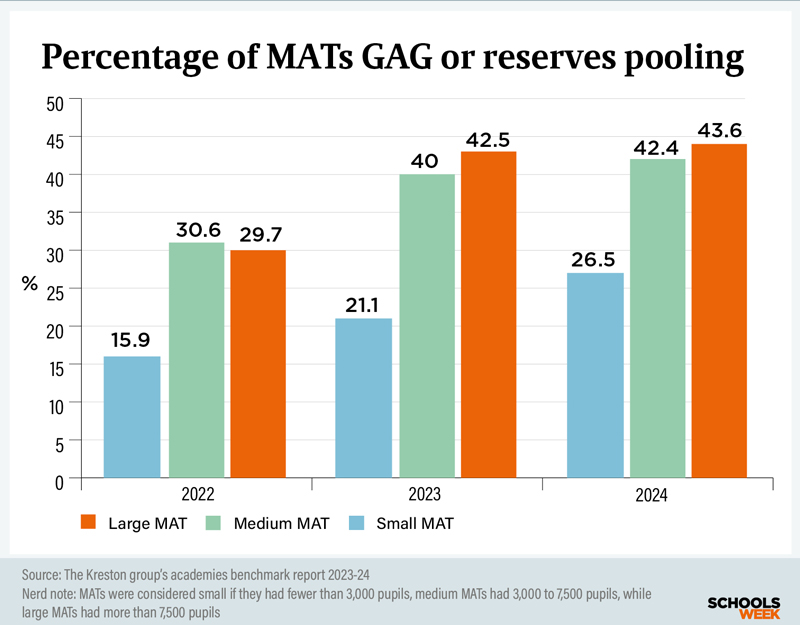Schools are having up to 28 per cent shaved off their budgets by academy trusts that pool their funding, an investigation has found.
Unions are now demanding greater scrutiny over how trusts pool budgets – known as general annual grant (GAG) pooling – as leaders await promised government guidance to support decisions around the controversial practice.
Schools Week analysis of 15 MATs that employ GAG pooling found dozens of schools with budgets that are 15 per cent less than allocated by the government’s national funding formula.
The retained cash is used to fund trust central teams, services provided back to schools or to bump up funding of other schools in the MAT.
Trusts say pooling allows them to save schools money through economies of scale. And redistributing cash to struggling academies means some can actually get more than allocated by the government.

But school finance expert Micon Metcalfe said there should be “more disclosure” around the funding model.
“The public generally should have a right to know that funding that is allocated to those children in those schools, if it’s not going directly to them, isn’t having a detrimental impact,” she said. “There should be a justification and clarity over it.”
GAG pooling is used by a fifth of trusts, surveys suggest. MATs pool all their schools’ funding that is issued by government, and dish out individual budgets based on their own criteria.
Other trusts top slice their school budgets to fund central services. Under this method, schools get their national funding allocations and the trust instead charges a fee. On average, top-slice charges range from 5.5 per cent in the large MATs to 8.8 per cent in the smallest. This figure is usually published in annual accounts.
Schools see 28 per cent budget cut
GAG-pooling trusts said details showing central service costs are given in annual accounts, but it is difficult to deduce what proportion this accounts for in individual schools.
So Schools Week asked 15 GAG-pooling trusts, through freedom of information requests, how much funding their schools got compared with the amount awarded by the Department for Education.
Ten responded with the full data.
Astrea Academies Trust rebuffed our request – saying releasing the information would be “prejudicial to the effective conduct of public affairs”.
Two other trusts, City Learning Trust and East Midlands Academy Trust, did not respond at all.
Of those that did respond, Aspire Academy Trust retained 24 per cent of its 37 schools’ GAG funding in 2023-24 – the highest of any trust.
Eight of its schools received 28 per cent less than their government allocation, with all the others having at least 15 per cent effectively sliced.
A spokesperson for the primary school-only trust said that while the pooled amounts “may appear comparatively higher” than others, allocations were “based on need and requirements”.
The range and scale of services provided to schools were extensive, they said, including estates management, IT, HR, health and safety, business support and school improvement support.
That left cash delegated to academies “specifically for school-based staffing and curriculum-related resources only”.
Pooling funding ensured “value for money at all times” and met the “needs of all academies… in a fair and equitable model”.
Some schools might also get an additional “reallocation” of their original GAG based on “individual needs”.
Trusts provide more services centrally
Oasis Community Learning, one of the country’s biggest trusts, took 17 per cent of its schools’ GAG allocations on average – the second highest. It did not provide school-level figures for its 54 academies, saying this would take more than 18 hours of staff time to compile, the limit for FOIs.
It was followed by the Paradigm Trust in London, whose schools got 15 per cent less than allocated by the government, analysis suggests.
In all, 77 schools across the 10 trusts who responded had at least 15 per cent of their budgets retained centrally.
At three of the MATs – Brigantia Learning Trust, Enquire Learning Trust and Our Lady of Lourdes – no schools had more than 10 per cent extracted.

However, sector leaders say it is not possible to compare trusts based on costs alone, as each provides its schools with different services.
For instance, Paradigm said it runs many central functions “that would, in other trusts, be expected in each individual school budget”, such as IT and SEND support, and mental health provision.
Its “entire school improvement team” was included centrally and not recharged to individual academies.
Dartmoor Multi Academy Trust retained about 12 per cent of school budgets overall last year. But as well as school improvement and financial management support, it provided schools with apprentice training, legal help and wellbeing forums.
Pooling ‘helps cut variances’ …
The academy trust handbook says GAG pooling enhances a MAT’s “ability to allocate resources in line with improvement priorities and running costs across the trust’s constituent academies”.
Lord Agnew, the former Conservative academies minister, said it was “one of the greatest [academy] freedoms” because it helped shift funding from stronger schools to stabilise weaker schools.
Tim Howes, the chief operating officer of Futura Learning Partnership, whose trust retained about 8 per cent of school budgets on average, said the MAT “wanted to ensure that variances in local authority approaches [to funding] do not adversely impact any of our schools”.
It works across five council areas. It also prioritises funding to disadvantaged schools.
Steve Rollett, the deputy chief executive of the Confederation of School Trusts, added pooling could allow trusts to target funding between schools, reserves, and shared services – “perhaps to cover a temporary blip in pupil numbers or to pay for a joint staff post”.
A report published by IMP Software last year found two thirds of GAG-pooling trusts allocated cash to their schools based on need.
Just over a quarter managed all funding centrally with “education budgets released for local requirements”, while one in 10 used revised models “to even out geographical differences”.
… and actually saves schools thousands
Oasis said it aimed to use 5 per cent of GAG to pay for “national services or ‘the centre’”. A further 12 per cent was “for costs that schools would have to include in their individual budgets”.
This led to a “lower cost and higher standard than might otherwise have been able to achieve alone”.
“We are confident that by procuring and delivering on scale… we can achieve better value for money than 54 schools purchasing the same services individually,” an Oasis spokesperson added.
‘Procuring and delivering on scale means better value for money’
It recalculated funding using pupil numbers and deprivation levels based on government rates, rather than those set by local authorities.
The only adjustments were £20,000 lump sums for one-form-entry schools and cash to support growing schools on lagged funding.
The Diocese of Ely Trust, which retained about 12 per cent of its schools’ GAG, said that when the value of the goods and services this paid for was accounted for, the smallest schools got “between 101 to 102 per cent of their ESFA income back”.
Among other things, it provided curriculum resources, CPD and insurance.
Brigantia said more than £440,000 went towards purchasing services for its schools such as IT technicians, Microsoft licences and exercise books.
The trust believes that once the services it provided back to schools were accounted for, the central trust held 6 per cent.
‘We don’t know if it’s value for money’
But a public accounts committee report from 2022 said the practice “means there is no way to identify if every pupil in a MAT has received the government’s guaranteed minimum level of funding”.
The practice also runs counter to the long-held aim of a national funding formula, to make funding more transparent by setting out in clear blocks how cash is awarded.
“It is a good thing that trusts can do it,” Metcalfe said. “But it’s very unclear how much is actually supporting very large central teams that may or may not provide value for money.”
Hilary Goldsmith, a school business leader, added “real, genuine transparency [between staff and MATs] about what GAG pooling is for, why and how it leads to school improvement” was needed.
“It’s about ensuring staff fully understand the value and agree with the numbers,” she said.
Metcalfe said per-pupil funding allocations for each school in GAG-pooling trusts should be published on MAT websites.
‘Thinking needed on collaborative decisions’
Rowena Hackwood, the chief executive of the Astrea Academy Trust, told a conference last month that the MAT has “had to have a little bit of a think about how we develop and present that idea of what it means to have a shared, collaborative view of how we allocate our resources”.
She said the amounts trusts ringfenced for things such as professional services, school improvement support and estates “typically comes to between 10 and 18 per cent”.
‘Scrutiny should be the price for receiving public money’
But she added: “What we were finding was that … our school leaders didn’t know that was the case, and they were wondering why they couldn’t get all of that stuff for 5 per cent.”
However, Astrea rejected our FOI request – despite acknowledging the public interest “in knowing how taxpayers’ money is used and how schools are resourced”. They said information available in the public domain was sufficient.
Daniel Kebede, the general secretary of the NEU, argued the “lack of transparency” around GAG pooling “makes a mockery of formularisation”.
“Scrutiny should be the price for receiving public money.”
But Rollett said that all trusts’ finances and processes were subject to rigorous external audit.
E-ACT and the David Ross Education Trust also said it was not possible to say how much of the GAG funding their individual schools were accountable for, and that some of this information was available publicly.
GAG pooling rise ‘inevitable’

Some, such as the EDSK think tank, have called for the practice to be banned.
On pooling allowing trusts to smooth out funding differences, Benedicte Yue, a trust chief financial officer, also said the national funding formula was “already allocating funding based on pupil characteristics”.
“It may not be perfect, but it is transparent, and GAG-pooling arrangements could perhaps be more clearly explained externally.”
But Dan Morrow, the chief executive of the Cornwall Education Learning Trust, said pooling funding was “an inevitable structural move”, with chains increasingly recognising they were “one employer”.
‘This is about using every lever we have to put children first’
“[This means] the notion of arbitrarily keeping funding in silos makes no organisational sense.

“Top-slicing relies on a static picture and is less responsive to need and the idea that you can resource where the highest need or risk is.”
Hackwood added: “One of our greatest strengths as a trust is our ability to harness our collective power—pooling resources to invest smarter, not harder.
“From finance to data systems, some services simply deliver better value when centralised. This is about using every lever we have to put children first.”
Pooling ‘might discourage schools from joining’
Despite this, the IMP report showed that some trusts believe pooling “might discourage schools from joining… especially in cases of voluntary transfers”.
There were also concerns about it potentially “diverting attention from broader funding challenges” to “complaints about the trust’s allocations”.
A report by Kreston accountants predicts pooling will continue to grow as it provided “more flexibility over how trusts achieve their objectives” and allowed them to “make quicker changes”.
Metcalfe added that “not giving people enough financial accountability and ability to deploy staff can mean that they cannot take accountability for standards”.
However, Chris Kirk, of education advisory firm CJK Associates, said providing more services from a trust level meant heads could “focus on teaching and learning. That can be a really good thing … it means that others who have professionally trained for managing estates, finance, HR can support them by focusing on those things.”
Where is promised guidance?
Schools Week revealed last year that the DfE was considering drawing up guidance on GAG pooling.
The department said this week that it “continues to consider and engage the sector to understand what further support and guidance might be helpful for academy trusts, across a range of areas, including on the pooling of GAG”.

Rules state that trusts “must consider the funding needs and allocations of each constituent” school and have an appeals process that can be escalated to DfE.
Its ruling would be final and could result in “pooling provisions being dis-applied”.
In February the government said no appeals on GAG pooling had been “escalated”.
And a former policy adviser, who did not want to be named, said: “In what other world would we expect an organisation to have a single strategy, but not a single budget? That makes no sense.
“And those wanting more red tape and checking and publishing of stuff – as if schools aren’t already heavily scrutinised – I’d ask why it’s OK for a trust to spend more money filling in forms, but not OK for them to spend more on a challenging school serving a low income community that needs to get better?
“I don’t know why we care about this if trusts are following the rules set out and the schools are getting better.”
How GAG pooling led to parliament spotlight
GAG pooling was thrust into the spotlight last year when staff at University of Brighton Academies Trust (UBAT) went on strike over the issue.
Schools Week revealed one of its schools had 20 per cent of its budget retained centrally.
One staff member said the practice “overrides the [DfE’s] funding formula” and was a “significant amount” from one school, which was “forced to make contact cuts whilst central teams get bigger”.
The issue even landed in parliament, with Catherine McKinnell, the schools minister, telling MPs: “The trust is now committed to … collaborating with school leaders on future budget setting.”
It will also now shut following the fall-out, with its schools handed to over trusts.
Our FOI shows UBAT took about 10 per cent from its schools’ budgets on average.
James Ellis, the trust’s lead National Education Union rep, claimed at the union’s conference last week the money was spent on “bloated executive pay”, with nearly “a million quid on marketing … and they were buying in loads and loads of private external consultants”.
The trust said it had “listened to our community” and was “reducing central spending this year”. It will now set budgets for next year on a typical 7 per cent top slice, which is “broadly in line with sector averages”.
But Schools Week’s FOI found three primaries in the trust received up to 20 per cent more than they were allocated by the ESFA – the most of any trust.
A spokesperson said these decisions “were focused on supporting some of our smaller schools with leadership capacity”.
















In my work with trusts, I have seen lots of different ways that top-slicing and pooling have been used and there is clearly no universal practice in either. It does make comparing trusts with each other difficult in terms of per pupil income and expenditure. For me, the biggest issue is how trusts are using their central budget and how they engage stakeholders in its plans and share how they do things and their performance with the wider public.
The national and local formulas that are in use to distribute funding are never going to perfectly match pupil need in an individual school with funding, however many factors are used and however complex they get. We should trust schools and trusts to decide for themselves how best to allocate their funds, within an appropriate regulatory framework.
I am less interested in the precise level of funding per pupil and more interested in how staff and parents in a school feel involved in decision making and how well they feel the school is adequately resourced and well managed. It is important to discuss issues like GAG pooling as they are fundamental changes to how things have been done. It is equally important not to dismiss their benefits because they are different.
Love your work, Jack.